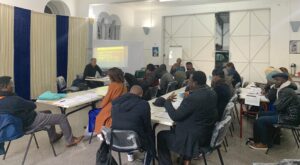 The story of Moses in Exodus 1-3 took on new relevance for me as we discussed these chapters with a group of sub-Saharan African migrants last week in Casablanca, Morocco.
The story of Moses in Exodus 1-3 took on new relevance for me as we discussed these chapters with a group of sub-Saharan African migrants last week in Casablanca, Morocco.
Those attending were all migrants pushed to leave their homeland by war and poverty. They came mostly from Congo, Cameroon, and Ivory Coast. Once in Morocco, their plans were to gather together enough money to pay the 1,600-3,000 Euros ($1,700-3,220) required by smugglers for a place on an inflatable raft to make the precarious crossing of the Mediterranean into Spain.
Many have been unable to cross into Europe due to stricter controls by the Moroccan Navy, rough seas, or lack of money. They are living in poor slums far from the center of Casablanca, and are active in house churches as pastors, worship leaders and evangelists. Many do not have papers to stay in the country legally, cannot open bank accounts and so have difficulties being paid if they find a job as most employers pay only through direct deposits. Many of the newest migrants are homeless, living on the outskirts of towns, in parks and even on the streets.
The group met in an airy classroom (modified garage) off the courtyard of a protestant church in the center of Casablanca. The temperatures were unusually cold (36-42 degree F), and the space unheated. It took most people over an hour to commute from their apartments far from the city center. Our teaching sessions were regularly interrupted by loud calls to prayer announced over a PA system from the Muslim prayer tower adjacent to the church.
Together we read Exodus 1, noticing that the multiplication of Israelite slaves in Egypt threatened Pharaoh to the point that he ordered the Israelite midwives and eventually the people themselves to kill every male child that was born.
As the story unfolds, our course participants are delighted to see how it was the women, (not considered a threat by Pharaoh), who resisted these laws, beginning with the midwives and ending with Pharaoh’s daughter herself! Their resistance included direct disobedience, outright lying, followed by more disobedience, hiding, assisting a fugitive to escape, spying and fraud.
Course participants had made long and dangerous journeys from their homelands, and knew firsthand that survival as a migrant often requires a clandestine existence which includes hiding, lying, paying bribes and breaking immigration laws. Since Christian proselytizing is illegal in Morocco, as is using an apartment for worship gatherings, much of what they do must be under the radar.
That God overtly blessed Israelite midwives, aiding and abetting all who resisted Pharaoh, clearly siding with those targeted for extermination (male babies) visibly encouraged people, who at the same time seemed to shift uneasily in their chairs when we spoke openly about what resistance to the powers of death looks like in Morocco today. Guilt and dis-ease regarding how God might see illegal survival tactics is common. Directly addressing clandestine survival practices through placing them face-to-face with Biblical stories like Exodus 1-3 brings initial discomfort followed by relief.
Next, we read the story of Moses in Exodus 2-3, who after being saved from death by women resisters and raised by Pharaoh’s daughter went out to see his people. When he saw an Egyptian taskmaster beating an Israelite slave, he looked both ways before killing the Egyptian and hiding his body in the sand.
When he learned the next day that he’d been discovered, Moses fled into the wilderness, and soon after he married the daughter of a pagan priest and worked shepherding his flock. There, on the far side of the wilderness the Angel of the Lord appeared to Moses in a burning bush.
“Where was Moses and what was he doing when God appeared to him?” I ask. “Was he in a church? Was he praying, fasting or reading his Bible?”
People shake their heads, smiling.
“No, he was in the wilderness, pasturing sheep,” someone says.
When I point out that Moses was between his homeland (Egypt) and Canaan, “the land flowing with milk and honey,” the story suddenly became especially relevant for them there in Morocco. They are all in this precarious in-between place, where Moses was found by Shepherd God.
“What would be modern-day equivalents in Morocco of Moses’ job pasturing someone else’s sheep?” I ask.
People mention working as assistants to masons– hauling sand and blocks and mixing cement to help build cinder-block structures.
One woman who only could attend one of our sessions shared how she works as a maid for a wealthy Moroccan family, from 6am until midnight six days a week, making the equivalent of 200 Euros (about $215) a month. She said many migrant women work as maids like her. I asked her if she has children and she told me she has a 23-old son somewhere in Tunisia, who is trying to cross into Europe. She didn’t know her other son’s whereabouts.
That day we heard the news of how nine migrants out of 50 had died of thirst and cold on a boat crossing from Tunisia that had lost its way.
We talk about how the angel of the Lord’s appearance to Moses in an ordinary bush that was on fire but not being consumed showed God’s premeditated, tactful effort to meet up with Moses. God had studied Moses, knowing his whereabouts, language and interests—just as God knows each of us. The angel of the Lord addressed Moses by his name, and also named his ancestors, showing his knowledge of fugitive Moses’ true identity. Moses reacted with fear and hid himself, evoking his fear after he’d killed the Egyptian and hid his body. People were touched by God’s response:
“I have surely seen the affliction of my people who are in Egypt, and have given heed to their cry because of their taskmasters, for I am aware of their sufferings. So, I have come down to deliver them from the power of the Egyptians, and to bring them up from that land to a good and spacious land, to a land flowing with milk and honey” (3:7-8).
God’s double seeing (I have surely seen = literally “I have seen seen”) shows God’s identification with Moses “seeing,” which led him to kill the lone Egyptian perpetrator in order to protect a single Israelite slave. Rather than arresting Moses and bringing him back to face Egyptian justice, God sends Moses back as a liberator to bring every Israelite slave out from the power of Egypt, and into a land flowing with milk and honey.
“Now, behold, the cry of the sons of Israel has come to me; furthermore, I have seen the oppression with which the Egyptians are oppressing them. Therefore, come now, and I will send you to Pharaoh, so that you may bring my people, the sons of Israel, out of Egypt” (Ex 3:9-10).
Our migrant course participants were touched by God’s full embrace of Moses, who had reacted against injustice and been forced to flee, like many of them. People seemed reassured and comforted as we read and discussed the story. People could see how consistently God expressed detailed knowledge of their oppression, siding with their deepest aspirations for freedom and a better life. God’s sending of Moses back to Egypt to free his enslaved people reinforced these house-church pastor’s deepest callings.
It suddenly dawned on me that once Moses had succeeded with God’s intervention to free the Israelite slaves from Egyptian oppression, he spent his entire life there “in the wilderness,” pastoring people in the in-between place, the “not yet” of the Kingdom of God.
This was both sobering and encouraging for these migrant pastors, who felt affirmed in their callings to keep serving vulnerable migrants during their stay in Casablanca.
One of the leaders who hosted us, who has lived 19 years in Morocco knows firsthand the dangers of crossing the Mediterranean. He has officiated many funeral services for migrants who drowned trying to cross into Spain. He still recognizes that Europe offers more opportunities for Africans fleeing war and poverty. He also knows without doubt that it is far from the “land flowing with milk and honey” that many imagine.
We learned from another one of our host pastors who has been in Rabat many years, that most migrants who make it to Morocco finally succeed in crossing to Spain. He told us that people who’ve passed through his church are now all over the world—even in the United States.
While in wilderness places like Casablanca, Rabat, and Tangiers, many are strengthened in their faith in the oases of house churches. In times of worship prior to each of our trainings, Gracie and I witnessed and experienced a contagious joy in these humble people that felt like a powerful foretaste of the feast to come.
On our last afternoon in Rabat before flying home I preached in a house church of 25 Congolese migrants in a poor neighborhood. There, serious engagement with Scripture, vibrant worship and dancing, intercession, healing prayer and preaching happened together, and people appeared to be energized in their faith, hope, love, and joy.
Last night we returned home to the Skagit Valley, which is itself also a wilderness for many. We come home with a desire to hang on to the joy we received, and to watch it increase and spread. We and our faith community so desperately need the fruits of the Spirit, which will be nurtured as come gather to study Scripture, pray, worship, partake in the sacraments and fellowship together.
Check out my weekly podcast, “Disciple: Word, Spirit, Justice, Mission,” accessed below. A Bible study on God’s call of Moses is included in Volume 3 of Guerrilla Bible Studies: God’s Radical Recruiting, featured below.